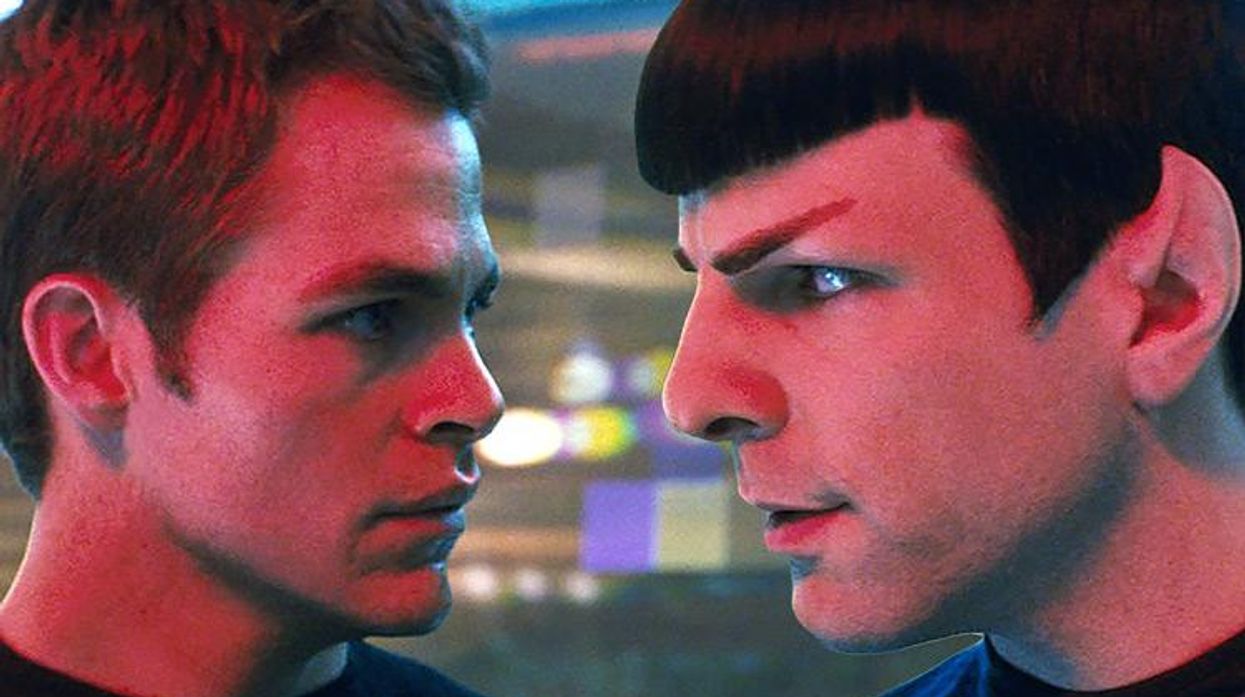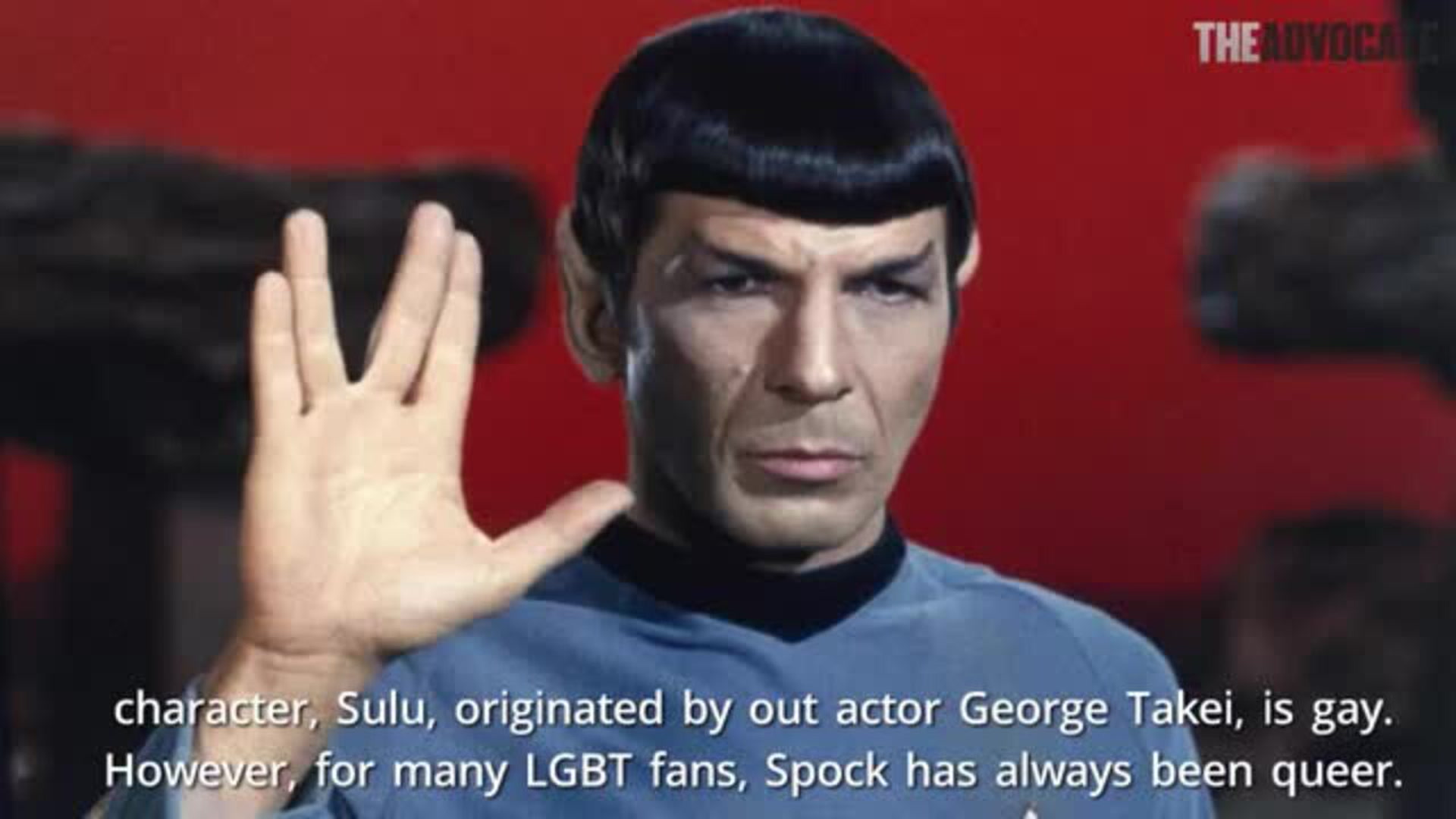film
Spock Is Gay, Not Sulu

The announcement of one Star Trek character's homosexuality detracts from another's longtime role as a queer icon.
Updated
March 12 2019 1:22 AM ESTdnlreynolds
By continuing to use our site, you agree to our Privacy Policy and Terms of Use.

The announcement of one Star Trek character's homosexuality detracts from another's longtime role as a queer icon.
"I have been and always shall be your friend," Spock tells Captain James T. Kirk in his emotional and iconic death scene in Star Trek II: The Wrath of Khan. The longtime friends stare at each other through a transparent wall. Each places his hand on the glass in the Vulcan salute before Spock collapses. It is clear that the heart of Kirk, who sinks to the floor as well, breaks.
The death of Spock is regarded as one of Star Trek's greatest moments. It marks the (albeit temporary) conclusion of one of the most celebrated relationships in television -- and later film -- history, one in which Spock's cool rationale was perfectly married with Kirk's fiery passion. It is also a heartbreaking moment where their love for one another shines through.
In recent weeks the creators of Star Trek Beyond, the new film produced by J.J. Abrams that premieres this weekend, has made headlines for revealing that Sulu, the character originated by George Takei, is gay. However, the news about Sulu has drawn attention away from another reality: For many LGBT fans, Spock has always been queer.
Indeed, as Spock's end in The Wrath of Khan demonstrates, the pair has an intertwined destiny that makes them more soul mates than friends. It was also not the first time they exchanged looks of longing. Since the franchise's inception in 1966, gay fans have read their own stories in the glances exchanged between the half-Vulcan and his human captain. Takei himself categorized these looks as the "gay anguish" felt by these viewers, especially in that era, in a new documentary on the life of actor Leonard Nimoy, For the Love of Spock.
This anguish is seen in the myriad YouTube videos that compile the pair's most homoerotic moments from the original series, which have garnered tens of thousands of views. Entire love stories have been assembled from these charged scenes as well. These scenes are sampled in For the Love of Spock, which was directed by Nimoy's son, Adam Nimoy. It also includes testimony from Takei and fans of the role of Spock as a gay icon.
The parallels between Spock and a queer person are many. As the only alien in the crew of the original starship U.S.S. Enterprise, he was physically and emotionally different from his peers. Due to his biology (Vulcans only become aroused every seven years in a phenomenon known as "pon farr"), his sexuality was also repressed, and thus the heterosexual relationships he observed also came off as alien.
"He's the original outsider," confirmed Dan Deevy, an entertainment journalist and Star Trek expert. Considering how it was the aim of creator Gene Roddenbery to create an inclusive universe "where everyone is accepted and everyone is equal and everyone gets along," Deevy could easily imagine how LGBT viewers of the original series were "seeing ourselves reflected in him." For decades, the absence of LGBT characters has made these projections inevitable.
In many respects, the franchise has been light-years ahead of the competition in showcasing diversity of race and background, giving hope to many members of historically marginalized communities. Whoopi Goldberg, who played Guinan on Star Trek: The Next Generation, recalled seeing the African-American character of Uhura in the original series as a turning point in her young life.
"Well, when I was 9 years old, Star Trek came on," she said. "I looked at it and I went screaming through the house, 'Come here, mum, everybody, come quick, come quick, there's a black lady on television and she ain't no maid!' I knew right then and there I could be anything I wanted to be."
While Star Trek has offered hope to many, it has failed its LGBT viewers in this representation for far too long. Since Star Trek is a vision of the future, this absence was problematic on multiple levels.
"Roddenberry's vision is that everyone is equal, everyone is accepted. There's no conflict left between human beings. So to just ignore the fact that gays exist was basically saying that we're not going to make it to the future, we're going to be gay-converted at some point and the gays will not exist," Deevy said. "That's a really bad message to have out there."
The powers that be of Star Trek Beyond addressed this absence by having Sulu be gay. Was it the right choice? In a surprise twist, Takei, while advocating for the importance of LGBT inclusion in the Star Trek universe, has spoken out against this creative decision. In an interview with The Hollywood Reporter, the gay actor said he believed that Sulu being gay went against the wishes of the franchise's late creator, Gene Roddenberry.
"I'm delighted that there's a gay character," Takei said. "Unfortunately, it's a twisting of Gene's creation, to which he put in so much thought. I think it's really unfortunate."
It's a vast compliment to the work of Takei, whose enduring success an out Asian-American has undoubtedly paved the way for Sulu's reimagining as queer. But the choice also left many other fans scratching their heads.
"Choosing to make it Sulu, for me, didn't make sense," agreed Deevy, who pointed to Sulu's history as a straight character and agreed with Takei that a new character who is LGBT would have been more appropriate. Deevy speculated, in light of Takei's real-life story, that it might be a move by the studio for "grouping all their gay into one area."
That said, Deevy, who is throwing a party, Gays in Space, in Las Vegas to celebrate the revelation of Sulu's homosexuality, is not undercutting the gay character's significance. "The fact that they're finally saying, you're there too, you'll make it, is huge."
Deevy, citing Star Trek canon, said one runs into similiar problems when considering either Spock or Kirk as queer. Kirk has always been portrayed as a womanizer. And Spock, beyond the initial series, has had relationships with women. But he doesn't see a bisexual identity as out of the universe of possibilites.
"I'm sure there's a good story to be told about them out on a mission way out in space and his seven-year itch happened," Deevy said. "I don't think it would be the same big deal that it is today all those years in the future."
And when asked if they loved each other, his answer was definite: "They did, absolutely, more than any of the women that were ever in either of their lives."
Whatever Spock's sexuality might be, there is no denying the impact of the casting of a gay man, Zachary Quinto, as the wise Vulcan in the new J.J. Abrams franchise. When fans across the world see the face of one of the most beloved characters in science fiction, they are looking at the face of an actor who is out and proud, the significance of which was articulated to Quinto by an LGBT activist from North Carolina, Melanie Skinner, at the Spock documentary's premiere at the Tribeca Film Festival in April.
"Zach, thank you for everything you've done for diversity and equality," Skinner said. "Spock and the original cast were my friends growing up. I was the ultimate outsider -- LGBT in North Carolina."
"Spock taught me what kind of person I wanted to be, the difference I wanted to make as a leader in the LGBT community in North Carolina," Skinner added. "Zach, you're carrying that on. And I want to thank you so much."
When asked by The Advocate after the screening what the lessons of Spock could teach, Skinner said the following: "Infinite diversity, infinite combinations. There was a whole philosophy behind the logic with Spock and Vulcan. It's what we need in the world. And that's what I try to live by."

Charlie Kirk DID say stoning gay people was the 'perfect law' — and these other heinous quotes